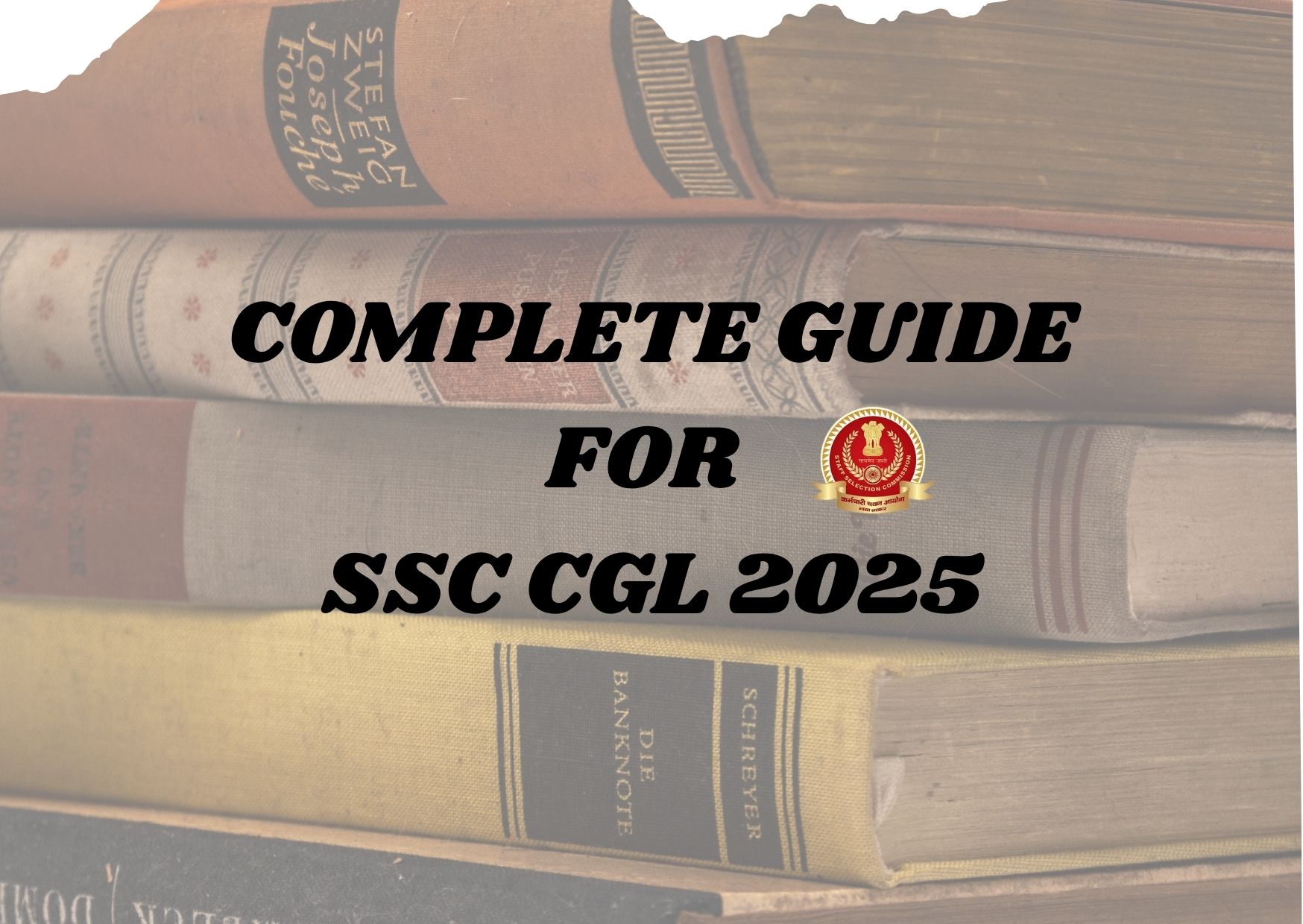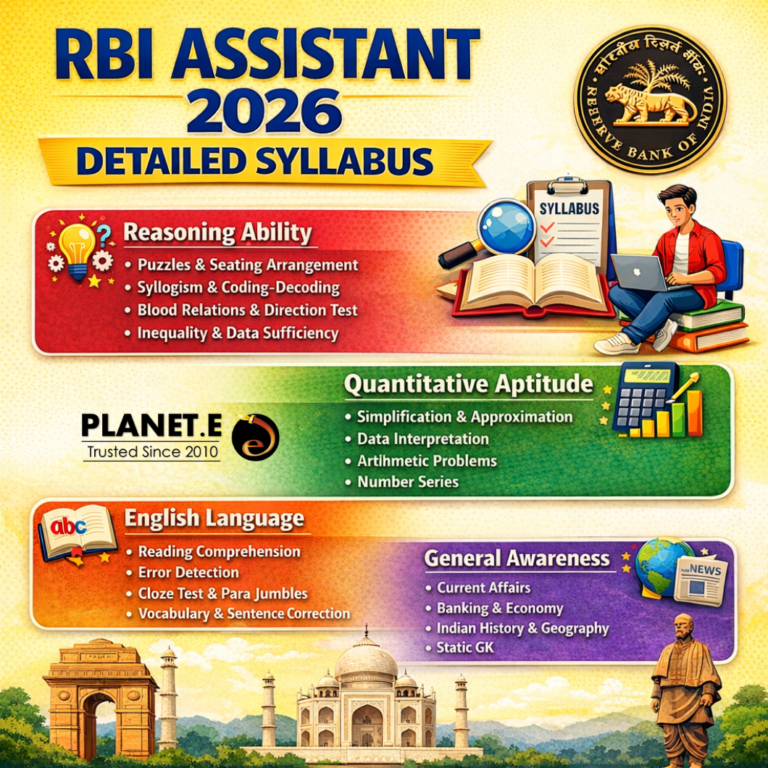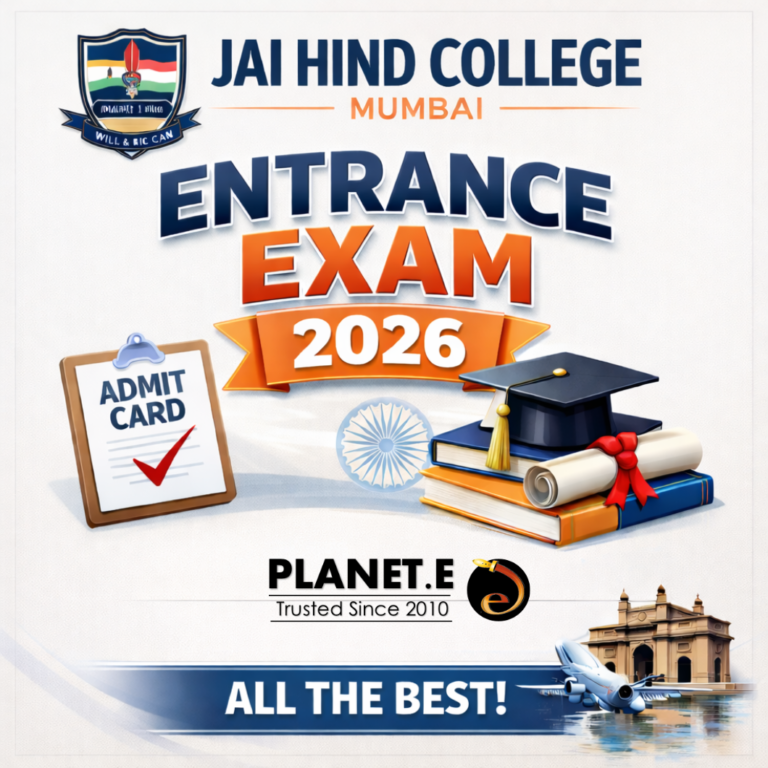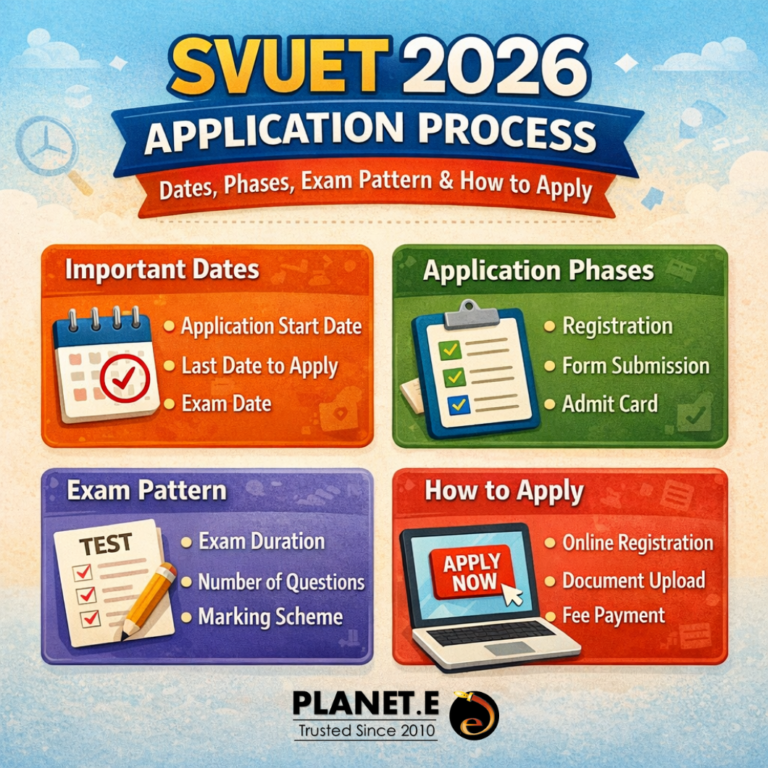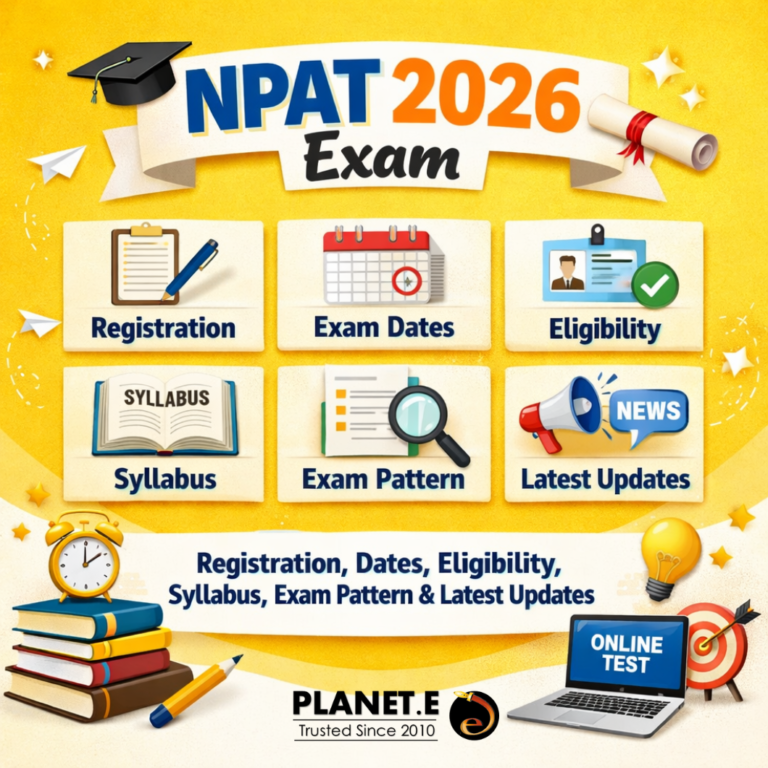Complete Guide for SSC CGL 2025
The SSC CGL (Staff Selection Commission Combined Graduate Level) Examination is a highly competitive exam in India for recruitment to various Group ‘B’ and ‘C’ posts in different Ministries/ Departments/ Organizations of the Government of India. For a beginner, a well-structured and disciplined approach is crucial for success. Here’s the Complete Guide for SSC CGL 2025
Here’s a detailed plan for beginner students to start their SSC CGL Preparation for the 2025 examination:
Understanding the Examination (Crucial First Step)
The SSC CGL 2025 Notification has been released on June 9, 2025, and the Tier 1 examination is scheduled to be conducted from August 13 to August 30, 2025. This gives you approximately 2 months from today (June 16, 2025). This is a tight but manageable timeframe for dedicated beginners.
- Know the Syllabus and Exam Pattern Thoroughly:
| Subject | Questions | Marks |
| General Intelligence & Reasoning | 25 | 50 |
| General Awareness | 25 | 50 |
| Quantitative Aptitude | 25 | 50 |
| English | 25 | 50 |
| Total | 100 | 200 |
Negative Marking: 0.50 marks for each wrong answer.
2. Tier 2 (For Final Selection): This also involves a computer-based examination with multiple papers depending on the post. Paper-I is mandatory for all posts.
Paper-I (Mandatory for all posts):
Section-I: Module-I (Mathematical Abilities) & Module-II (Reasoning & General Intelligence)
- Mathematical Abilities: 30 Questions, 90 Marks
- Reasoning & General Intelligence: 30 Questions, 90 Marks
- Total: 60 Questions, 180 Marks. Time: 1 hour.
Section-II: Module-I (English Language & Comprehension) & Module-II (General Awareness)
- English Language & Comprehension: 45 Questions, 135 Marks
- General Awareness: 25 Questions, 75 Marks
- Total: 70 Questions, 210 Marks. Time: 1 hour.
Section-III: Module-I (Computer Knowledge Test) & Module-II (Data Entry Speed Test)
- Computer Knowledge Test: 20 Questions, 60 Marks (Qualifying)
- Data Entry Speed Test (DEST): 15 minutes (Qualifying)
Paper-II (Statistics): For Junior Statistical Officer (JSO) posts. 100 Questions, 200 Marks. Time: 2 hours.
Paper-III (General Studies (Finance & Economics)):
For Assistant Audit Officer/Assistant Accounts Officer posts. 100 Questions, 200 Marks. Time: 2 hours.
Gather Study Materials:
NCERT Books: Start with NCERT books for basic understanding, especially for General Awareness (History, Geography, Polity, Science) from Class 6 to 10.
Subject-specific Books (Recommended for Beginners):
Quantitative Aptitude:
- “Quantitative Aptitude for Competitive Examinations” by R.S. Aggarwal
- “Fast Track Objective Arithmetic” by Rajesh Verma (Arihant)
- “Play with Advanced Maths” by Abhinay Sharma (for concepts)
English Language:
- “From Plinth to Paramount” by Neetu Singh (KD Publication) – excellent for grammar basics.
- “Objective General English” by S.P. Bakshi (Arihant) – for practice.
- “Word Power Made Easy” by Norman Lewis – for vocabulary.
General Intelligence & Reasoning:
- “A Modern Approach to Verbal & Non-Verbal Reasoning” by R.S. Aggarwal
- “Analytical Reasoning” by M.K. Pandey
General Awareness:
- Lucent’s General Knowledge (a must-have for factual information)
- Daily Newspaper (for Current Affairs)
- Monthly Current Affairs Magazine
- Previous Year Question Papers: Essential for understanding the exam pattern, question types, and difficulty level.
- Online Resources/Mock Tests: Websites, apps, and online coaching platforms offer valuable study material and mock tests.
3. Create a Realistic Study Plan (Approx. 2 Months till Tier 1):
Given the limited time, focus intensely on Tier 1 and build a strong foundation.
Phase 1: Foundation Building (Weeks 1-4)
- Focus: Understand core concepts, complete syllabus for Tier 1.
- Time Allocation: Dedicate 6-8 hours daily.
| Subject | Topics to Cover | Daily/Weekly Focus | Resources |
| Quantitative Aptitude | Number System, Simplification, Percentages, Ratio & Proportion, Averages, Profit & Loss, Simple & Compound Interest, Time & Work, Time & Distance, Mensuration (basic formulas). Start with basics of Algebra, Geometry, and Trigonometry. | 2-3 hours daily. Focus on understanding concepts, formulas, and basic problem-solving techniques. | R.S. Aggarwal, Rajesh Verma, NCERT (Class 8-10 Maths), Online tutorials. |
| English Comprehension | Grammar Rules (Tenses, Articles, Prepositions, Conjunctions, Subject-Verb Agreement), Basic Vocabulary (Synonyms, Antonyms, One-word substitutes, Idioms & Phrases), Reading Comprehension (practice with simple passages). | 1.5-2 hours daily. Learn 10-15 new words daily, read newspapers/editorials, practice grammar exercises. | “From Plinth to Paramount,” “Word Power Made Easy,” daily newspaper, online grammar resources. |
| General Intelligence & Reasoning | Analogy, Classification, Series (Number, Alphabet, Mixed), Coding-Decoding, Blood Relations, Direction Sense, Syllogism (basics), Venn Diagrams, Non-verbal reasoning (Mirror, Water Image, Embedded Figures, Paper Folding). | 1.5-2 hours daily. Understand types of questions, practice easy to medium level problems. Focus on logic. | R.S. Aggarwal, M.K. Pandey, online reasoning puzzles. |
| General Awareness | Static GK: Indian History (Ancient, Medieval, Modern – key events, dynasties), Indian Polity (Constitution, fundamental rights, duties), Geography (Indian & World – basic concepts), Science (Physics, Chemistry, Biology – basic facts). | 1-1.5 hours daily. Read Lucent’s GK, make short notes. | Lucent’s General Knowledge, NCERT (Class 6-10 Science, History, Civics, Geography). |
| Current Affairs | Major National & International Events, Awards, Sports, Books & Authors, Government Schemes (last 4-5 months). | 30 minutes daily. Read newspaper, follow a good monthly current affairs magazine/website. | The Hindu/Indian Express, Monthly Current Affairs Magazine (e.g., Pratiyogita Darpan, online sources). |
| Revision & Mock Test | Weekly revision of all subjects. Take one full-length mock test. | Weekly. Analyze performance and identify weak areas. | Previous Year Papers, Online Mock Tests. |
Phase 2: Practice and Refinement (Weeks 5-8)
- Focus: Intensive practice, mock tests, time management, and error analysis.
- Time Allocation: 8-10 hours daily.
| Activity | Weekly Focus | Resources |
| Topic-wise Practice | Dedicate specific time slots to practice questions for each subject, focusing on topics where you need improvement. Increase difficulty level gradually. For Quantitative Aptitude, focus on speed and accuracy. For English, practice cloze tests, error spotting, and sentence improvement. For Reasoning, try to solve puzzles quickly. For GA, revise static facts. | Respective Subject Books, Online Quizzes. |
| Full-Length Mock Tests | Take at least 3-4 full-length mock tests per week under exam conditions (timed). | Online Mock Test Platforms, Previous Year Papers. |
| Mock Test Analysis | Crucial Step: Spend equal time analyzing your mock tests. Identify: 1. Questions you got wrong. 2. Questions you skipped. 3. Questions that took too long. Understand the reason for errors. Revise concepts if needed. | Your mock test results. |
| Revision | Daily quick revision of formulas, vocabulary, and important facts. Focus on weak areas identified from mock tests. Maintain a separate notebook for errors and important points. | Your self-made notes, flashcards. |
| Current Affairs | Continue daily reading and revision of monthly compilations. | Newspaper, Monthly Magazine. |
4. Key Strategies for Beginners:
- Start with Basics: Do not jump to advanced problems without clearing your fundamental concepts.
- Consistency is Key: Stick to your study plan diligently. Even short, consistent study sessions are more effective than sporadic long ones.
- Understand, Don’t Just Memorize: Especially for Quantitative Aptitude and Reasoning, focus on understanding the logic and application rather than rote memorization of solutions.
- Prioritize Accuracy then Speed: As a beginner, focus on getting the answers correct. Speed will naturally improve with consistent practice.
- Time Management: During practice and mock tests, learn to allocate time effectively to each section. Don’t spend too much time on a single question.
- Regular Revision: Frequent revision of concepts and formulas is vital to retain information.
- Analyze Your Performance: After every practice session or mock test, spend time analyzing your mistakes and understanding where you went wrong. This is the most effective way to improve.
- Stay Updated with Current Affairs: General Awareness is a vast section. Consistent reading of newspapers and current affairs magazines is essential.
- Maintain Health: Ensure adequate sleep, a healthy diet, and short breaks to avoid burnout.
- Stay Positive: The journey can be challenging, but self-belief and a positive attitude are crucial.
Tabular Representation of a Sample Daily Study Plan (Approx. 2 months)
This is a general template; adjust it based on your strengths and weaknesses.
| Time Slot | Monday | Tuesday | Wednesday | Thursday | Friday | Saturday | Sunday |
| 7:00 – 8:00 AM | Current Affairs & Static GK Reading | Current Affairs & Static GK Reading | Current Affairs & Static GK Reading | Current Affairs & Static GK Reading | Current Affairs & Static GK Reading | Weekly CA Revision & Quiz | Rest/Light Revision |
| 8:00 – 9:30 AM | Quantitative Aptitude (Concepts) | Quantitative Aptitude (Practice) | Reasoning (Concepts) | Reasoning (Practice) | English (Grammar) | Mock Test (Tier 1) | Relaxation |
| 9:30 – 10:00 AM | Short Break | Short Break | Short Break | Short Break | Short Break | Short Break | Short Break |
| 10:00 – 11:30 AM | English (Grammar Practice) | English (Vocabulary) | Quantitative Aptitude (Concepts) | Quantitative Aptitude (Practice) | Reasoning (Practice) | Mock Test Analysis | Errata/Weak Area Practice |
| 11:30 – 12:00 PM | Short Break | Short Break | Short Break | Short Break | Short Break | Short Break | Short Break |
| 12:00 – 1:30 PM | General Awareness (History) | General Awareness (Polity) | General Awareness (Geography) | General Awareness (Science) | General Awareness (Mix) | Weak Area Practice | Leisure/Hobbies |
| 1:30 – 2:30 PM | Lunch & Rest | Lunch & Rest | Lunch & Rest | Lunch & Rest | Lunch & Rest | Lunch & Rest | Lunch & Rest |
| 2:30 – 4:00 PM | Quantitative Aptitude (Practice) | Reasoning (Practice) | English (RC & Cloze) | Quant (Advanced Basics) | Reasoning (Puzzles) | Previous Year Paper Solve | Optional Study/Revise |
| 4:00 – 4:30 PM | Short Break | Short Break | Short Break | Short Break | Short Break | Short Break | Short Break |
| 4:30 – 6:00 PM | Revision of concepts/ Practice weak areas | Revision of concepts/ Practice weak areas | Revision of concepts/ Practice weak areas | Revision of concepts/ Practice weak areas | Revision of concepts/ Practice weak areas | Self-analysis and planning for next week | Early Dinner/Rest |
| 6:00 – 7:00 PM | Relax/Walk | Relax/Walk | Relax/Walk | Relax/Walk | Relax/Walk | Relax/Walk | Relax/Walk |
| 7:00 – 8:30 PM | Problem Solving/Doubt Clearing | Problem Solving/Doubt Clearing | Problem Solving/Doubt Clearing | Problem Solving/Doubt Clearing | Problem Solving/Doubt Clearing | Early to Bed | Early to Bed |
| 8:30 – 9:00 PM | Dinner | Dinner | Dinner | Dinner | Dinner | ||
| 9:00 – 10:00 PM | Quick Review of Day’s Study | Quick Review of Day’s Study | Quick Review of Day’s Study | Quick Review of Day’s Study | Quick Review of Day’s Study |
Important Considerations:
- Flexibility: This is a sample plan. Adjust it based on your personal learning style, speed, and existing knowledge. If you’re strong in one subject, you can dedicate less time to it and more to weaker areas.
- Short Breaks: Incorporate short breaks every 1-1.5 hours to maintain focus and prevent fatigue.
- Sleep: Ensure 7-8 hours of quality sleep.
- Stay Hydrated & Eat Healthy: These contribute significantly to your concentration and overall well-being.
- Avoid Distractions: Minimize social media, unnecessary Browse, and other distractions during study hours.
By following this detailed plan and staying consistent, a beginner can definitely lay a strong foundation for the SSC CGL 2025 examination and significantly increase their chances of success. Good luck!
Join Planet E Family
We are located conveniently,
Address: 104, 1st Floor, Civic Centre, MMGS Marg, Dasturwadi, Opp. Sunshine Plaza, Near Kailash Lassiwala, Dadar East, Mumbai 400014
Address: Office no 3, 1st Floor, Siddharth Tower, Gokhale Road, Ambedkar Chowk, Jambli naka, Next to Thane Station, Thane West, Thane, Maharashtra 400601
Take that first step toward your dream – Contact us today!

